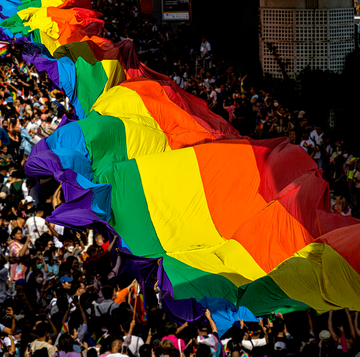Since the inauguration in January, Trump has issued a series of discriminatory executive orders restricting access to gender-affirming care for trans youth, banning trans women and girls from participating in women’s sports, declaring that the federal government will only recognize two genders (impacting identifying documents like passports and visas), banning transgender people from serving in the military, and so much more.
Thankfully, many of these executive orders are being challenged in court as we speak. But the messaging has already infiltrated the brains of Trump supporters (and beyond) far and wide, normalizing these hateful thoughts and actions in our country.
So what do we do? We speak out and spread facts. Especially with those closest to us who might not be informed or might not understand. That’s not always easy though, especially when emotions get involved and you end up getting upset and flustered. To help, I tapped three experts to create a list of responses to common (and problematic) refrains about the trans community you might come across in future discussions.
Our Experts
- Shane Diamond, a gender equity consultant and GLAAD’s director of communications and advocacy.
- Meredithe McNamara, MD, MS, FAAP, a pediatrician specializing in adolescent medicine and an assistant professor at Yale School of Medicine.
- Gillian Branstetter, a communications strategist at the ACLU’s Women’s Rights Project and LGBTQ & HIV Project and formerly of the National Center for Transgender Equality.
In any discourse with someone who doesn’t think like you, it’s always important to make sure the other party knows you’re actually also listening—not just arguing. But if tensions do get high, the Q&As below can serve as a script of sorts to fall back on when you want to make sure you’re hitting all the key talking points while supporting and speaking up for the trans community.
“People are born with either a penis or a vagina. I don’t think you can just decide what you want to be.”
Dr. Meredith McNamara: Actually, some people are born with neither or with genitalia that doesn’t fit binary concepts of sex. What sex is someone who is born without a vagina but has XX chromosomes (MRKH Syndrome)? What sex is someone who has XXY chromosomes and little to no detectable testosterone levels in adulthood (Klinefelter syndrome)?
But let’s take a step back and look at this from a different angle: Gender and sex are different. Gender identity develops long before the physical change of puberty. People generally know their gender long before secondary sex characteristics develop, because gender identity has its own strong biological basis rooted in the brain and it exists separately from chromosomes, gonads, and hormones.
Gillian Branstetter: And why not? Every culture in human history has had people who reject their gender assignment in one way or another, and decades of feminist legal progress has challenged the idea that biology must be our destiny. Transgender people come from all walks of life—every ethnicity, every background, every country, every political party. All people deserve the freedom to be themselves without fear, and that includes transgender people.
“I still don’t know if I believe trans people are even real.”
Shane Diamond: Everybody has a gender: an internal sense of self as it relates to the gendered world around us. For many people, that inner sense of self matches the sex they were assigned at birth—for example, someone assigned female at birth who knows herself to be a woman. This simply means they are cisgender! For other people, their inner sense of self is different from their sex assigned at birth, causing an incongruence with who they know themselves to be and how the world sees them. This person might call themselves transgender. That doesn’t make anyone’s gender more or less valid than someone else’s—it just means they’re different. At the end of the day, we don’t expect everyone to know exactly what it means to be transgender, but we do expect people to respect each other, even when we are different.
“I think people only act trans for attention. I’m afraid my kid is going to be influenced and want to do so, too.”
Gillian Branstetter: Transgender people face discrimination, mistreatment, and abuse across our lives. We’re four times as likely to experience violence and much more likely to experience poverty and homelessness. While nobody should have to pay such a price just for being true to themselves, I hardly think anyone wants that kind of “attention.” Also, transgender people are raised around cisgender people all the time—it never seems to “rub off” on us.
Dr. Meredithe McNamara: In my practice, I only see the opposite—most young people who are trans try to present as cis for a period of time to deflect attention or to not stand out. It’s never been harder to be trans. While many things can be socially influenced, we know that gender identity cannot. Studies have shown that trans people report a long-standing knowledge of their gender identity—it often takes years before they disclose that identity outwardly. Gender conformity is the real social contagion at play, not trans identity.
“I’ve heard stories of people regretting getting surgery or taking hormones—what if it’s just a phase?”
Dr. Meredithe McNamara: Some people regret all types of medical care, whether it’s knee replacement surgery, spine surgery, or Accutane. With surgery and hormones, regret rates are less than 1 percent—among the lowest in all of medicine. But it’s also important to think about regret itself and what it means. People who express regret about surgery or hormones often say that it’s just too hard to be trans in an openly hostile society. For those people, it’s not health care at the root of regret—it’s housing discrimination, job loss, violence, and political targeting. Until we ensure the same dignities for trans people as we do for everyone else, we need to think about regret in dimensions and never use it as a reason to snuff out opportunities for care.
“I feel silly telling people my pronouns and calling people ‘they.’”
Dr. Meredithe McNamara: You’d probably hold a door open for someone or make an effort to spell their name correctly in an email. You’d probably also expect others to get your pronouns right. Moreover, there are plenty of times when we simply can’t discern someone’s gender because they haven’t told us and we’ve never met them. We naturally revert to using gender-neutral pronouns in those cases. Keep that in mind and remember that something small can make someone else’s day.
Also, it’s totally normal to be nervous about getting this wrong. I get people’s pronouns wrong and it doesn’t feel great, but I own it and move on. I’ll usually say, “Hey, I got your pronouns wrong—next time, I’ll get it right!” It removes the awkwardness where the other person feels like they have to comfort the one making a mistake and it gets us back on track to whatever it was we were talking about.
Shane Diamond: I totally get it. It can feel unfamiliar to refer to someone using they/them pronouns, but we actually use those pronouns all the time for individuals. For example, if I found a backpack and was bringing it to a lost and found, I’d say, “Someone forgot their backpack.” I don’t know who forgot it, so using “their” acts as a singular person pronoun regardless of gender. It can take practice, but it’s not grammatically incorrect or even uncommon in our language. If using someone’s correct pronouns feels too clunky or too complicated, you can always skip pronouns and just use their name. But at the end of the day, using someone’s correct pronouns isn’t about you—it’s a way of showing respect for someone else.
“People just shouldn’t be taking extra hormones that their bodies aren’t producing.”
Dr. Meredithe McNamara: Let’s get back to biology for a second: Ovaries and testicles both produce estrogen and testosterone. So this statement has some fundamental flaws. But let’s also think about what would happen if we applied this statement’s logic broadly: We’d cosign a lot of bad health care. We wouldn’t offer testosterone replacement therapy to cis men with low libido, we wouldn’t help ease cis women into menopause safely or respectfully, and we wouldn’t support people who lose those gonadal functions due to cancer. We wouldn’t be able to suppress life-threatening menstrual bleeding in people with bleeding disorders like hemophilia! I don’t think anyone wants that. If there’s a seat at the table of good health care for these cis people, then there’s a seat at the table for trans people, too.
Gillian Branstetter: The treatments transgender people access are no different from the treatments millions of cis people rely on for their health needs. And importantly, decisions about medical care should be kept between patients and their doctors—not politicians.
“I can’t wrap my head around how someone would not want to be the gender that they were born. I find it really hard to accept.”
Gillian Branstetter: The good news is you don’t have to understand everything about a transgender person to know they’re as deserving of respect and equal treatment as everyone else, and that’s all most are asking for. Every day we interact with people of different races, religions, and backgrounds, and we don’t need to be an expert in their experience to trust them with their experience and treat them with the same dignity we would want for ourselves.
Dr. Meredithe McNamara: Imagine if you—as a woman—sprouted hair on your chest and had genitalia hanging outside of your body that made you feel completely unlike yourself. What if society would only treat you with dignity and respect if you wore masculine clothing? If you can step into that headspace for a second and experience a smidge of that discomfort, imagine feeling that every moment of your life. The fact that trans people can and do navigate gender dysphoria is beyond admirable. Let’s also reframe the concept of choice: People don’t want to be a gender—they are a gender. They choose whether to present themselves to society as that gender, and that choice is what gender-affirming care can facilitate.
“I think people could use being transgender as an excuse to get into places they don’t belong. What are we doing about potential creepy situations or predators?”
Shane Diamond: We already have existing state and federal laws that protect people, specifically women, from predators, harassment, and assault. It’s already illegal to assault someone, regardless of gender or location. Despite fearmongering from anti-transgender voices, the truth is, transgender people are actually most at risk for being attacked in the restroom. Being that trans women are women and trans men are men, each should use the respective restroom that aligns with their gender. Ultimately, we’re all trying to do the same thing in restrooms—use a likely-under-serviced toilet and check our social media—regardless of our gender.
“I’ve heard that it’s really easy to get gender-reassignment surgery.”
Dr. Meredithe McNamara: Wow, this is news to me! Every patient I’ve had who’s gotten any form of gender-affirming surgery has gone through years of deep introspection about what’s right for them. Once they’ve arrived there, they’ve jumped through hoop after hoop after hoop to connect with the right providers.
Shane Diamond: First, let’s talk about what this really is: medically necessary healthcare for trans and nonbinary people. (“Gender-reassignment surgery” is also an outdated phrase that’s not commonly used anymore.) Second, have you ever tried to schedule any kind of surgery in this country?! Nothing in health care happens quickly or easily, and that’s not even factoring in maneuvering insurance coverage. It’s also important to remember that there’s no single way to be transgender or nonbinary, and that not every trans or nonbinary person will choose—or be able to afford—a medical transition. These decisions, like all personal and private health care decisions, are best left to patients, their families if applicable, and their health care providers.
“I think people could use being transgender as an excuse to get ahead in places like sports where they wouldn’t otherwise have a competitive edge.”
Shane Diamond: It is not true that people are claiming to be transgender when they are not. Given how difficult it is to navigate our complicated and tedious health care system and all the discrimination and challenges trans people face, no one is faking being transgender for any advantage—be it in sports or anywhere else.
Out of the millions of global competitive athletes, there are only a handful of transgender people competing at high-level sports, and—despite sensational media narratives—we’re not always winning! It is especially important in the context of youth sports that all kids—transgender and cisgender alike—have an opportunity to participate in sports with their friends to learn valuable, lifelong lessons through being part of a team...without being subjected to gender- and appearance-based discrimination.
Ultimately, these anti-trans actions harm all girls and women, punishing gender non-conformity of any kind and imposing rigid gender roles and expressions on everyone.
“Feeling like you’re a different gender is a mental illness, right? We should focus on fixing that first and foremost.”
Dr. Meredithe McNamara: The American Psychiatric Association doesn’t consider gender dysphoria to be a mental illness—it’s classified as a sexual health condition that arises from discordance between one’s physical body and sense of self. But let’s talk about the word “fix.” How? There is no alternative treatment for gender dysphoria beyond access to thoughtful, multidisciplinary gender-affirming medical care. It’s not right for everyone, but it’s right for many.
Shane Diamond: Being transgender and/or nonbinary is one of nature’s many variations—the way some people have blue eyes, brown eyes, or green eyes. Being transgender is an innate part of who someone is and there’s nothing anyone can do to change that. External forces attempting to change someone’s gender or sexual orientation are ineffective at best and extremely harmful at worst.
Transgender people are not the problem and are simply trying to live safely. The Trump administration has spent millions of dollars vilifying and discriminating against transgender people—why? The American public has many issues of importance, including the economy and climate change, and yet opponents of equality are wasting important resources and attention perpetuating hatred and divisiveness. If anything needs to be fixed, it’s our society's rigid rejection of anyone who is different.
Photos of experts are courtesy of subjects. Answers have been lightly condensed and edited for clarity.















